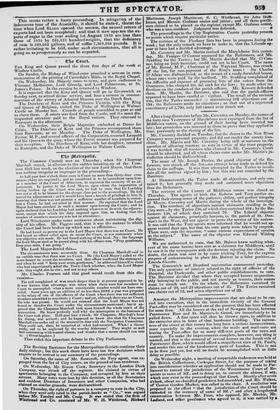be lattropaiti.
The Common Council met on Thursday ; when Sir Chapman Marshall stated, in allusion to the sudden breaking-up of the Com- mon Hull last week, on the election of the new Lord Mayor, that there was nothing irregular or improper in the proceeding— At half-past four o'clock there were in Court no more than thirty-four corn) moners (forty are required); and lie considered it to be incumbent upon him. as a member of the Court of Aldermen, to represent the necessity of an ad- journment. In justice to the Lord Mayor, upon whom the imputation of baying broken up the Court was cast, he had to state that his Lordship was not at all to be blamed for the abrupt close put to the proceedings: He bad moved the adjournment ; and it would have been a breach of privilege in him if, knowing that there was not present a sufficient number of members to consti- tute a Court, he had not acted in that manner. lie regretted that the Lord Mayor had been attacked in ends a manner upon leaving the Court ; and he again declared that his Lordship had nothing whatever to do with the adjourn. ment, except that which his duty imposed upon him, on finding that the number of members necessary was not in attendance.
Lord Winchester spoke some sentences about maintaining the dig. nity of his office. Mr. Figgins said, that it was the manner in which the Court had been broken up which was so offensive— He had heard no person say to the Lord Mayor that there was no Court. He had heard no officer called upon to count the Court, as was customary when any objection was made. He had heard nothing of the kind. No: the language the Lord Mayor used as he passed along with his officers was, "Pray gentlemen, keep your seats, I am going."
The Lord Mayor denied this— The circumstances were accurately these. Sir Chapman Marshall said in an audible tone that there was no Court. He (the Lord Mayor) called to the mace-bearer to count the members, and that officer confirmed the statenaent ; and when he said " Keep your seats, gentlemen," he addressed himself to those who had impertinently asked the Town-Clerk whether, when the Lord Mayor rote, they ought also to rise ; and not to any others.
Mr. Charles Pearson said that good would result from this dis- cussion— The evil complained of was much deeper than it at present appeared to be. It was known that advantage was taken when there were few members in Court to accomplish what a more considerable number would not have con- ceded. Some years ago, an addition of no less than 1000/. a year was proposed to the salary of one of the officers of the Court when there was not sufficient members assembled to constitute a Court; and yet, although there was no Court, the vote was passed. He would not contend that the Lord Mayor was not bound to dissolve the Court under the circumstances mentioned ; but it ap- peared that Sir Chapman Marshall took upon himself the whole merit of the transaction. He knew perfectly well why the interruption to the business of the Court took place. Half. past four o'clock, Sir Chapman, Marshall's hour for dining, was arrived ; and he happened to know also that Sir Chapman Marshall was under sail at the moment to dine with the Navigation Committee. They could not, then, be surprised at what had occurred. What ! a dinner ready, and to be neglected by the worthy Alderman! They might as well bait amousetrap with toasted cheese, and wonder that a mouse should run into It. ( Great laughter.)
Thus ended this important debate in the City Parliament.


























 Previous page
Previous page